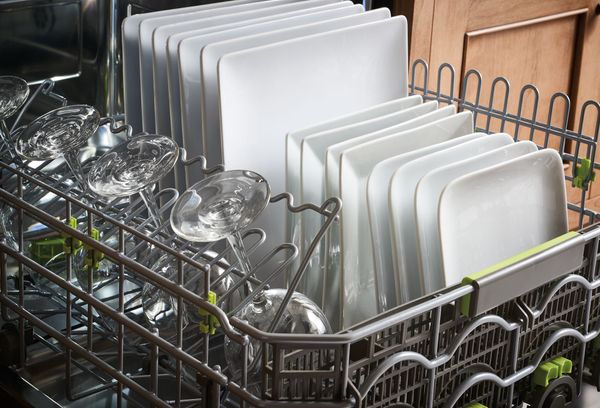
At a Glance
What are the effects of hard water on dishes?
How do you get rid of hard water stains?
How can I prevent hard water stains on dishes?
What are the best water softeners to prevent hard water stains?
We’ve all seen hard water stains: white, splotchy spots tarnishing the shine of glass, plastic, and metal dishes. We don't have to tell you that these pesky spots are unwelcome sights in many kitchens.
They manifest because a large portion of the water supply is categorized as hard water. Hard water is water with a high concentration of minerals like magnesium and calcium, which are collected in the water as it makes its way through the pipes and faucets that deliver it into households. In the case of dishes, hard water stains are created from these minerals that the water leaves behind as it evaporates.
In this guide, we’ll look at how to remove hard water stains on glass and other dishes with prevention techniques and cleaning methods.
Understanding Hard Water: Causes and Effects
Hard water is a common issue in many households, often recognized by the white, chalky stains it leaves behind on dishes and appliances. By understanding what hard water is, how it forms, and its effects, you can take steps to minimize its impact on your home.
What is Hard Water?
Hard water contains high levels of minerals like calcium and magnesium, which it picks up as it flows through mineral-rich areas. This makes it distinct from soft water, which has low mineral content.
Causes of Hard Water
Hard water forms when water passes through mineral-rich environments, such as limestone or chalk, which are composed of calcium and magnesium carbonates. As water moves through these areas, it absorbs the minerals, increasing its hardness. The hardness level in water can vary depending on the geographical region, as some areas have naturally higher mineral content in their water sources.
Hard Water vs. Soft Water
Unlike hard water, soft water contains minimal calcium and magnesium ions. As a result, soft water does not leave mineral deposits, making it more desirable for household use. Soft water is gentler on appliances, more effective in cleaning, and helps prevent the buildup of soap scum and hard water stains.
Grasping the causes and impacts of hard water is essential for homeowners looking to safeguard their appliances and keep their dishes spotless.
Effects of Hard Water on Dishes
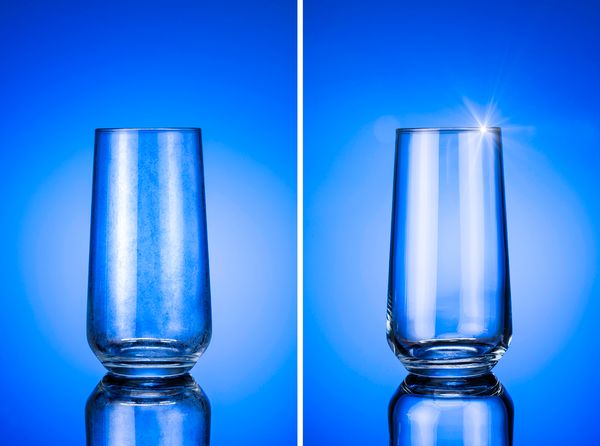
The main effect of hard water on dishes is hard water stains. These can occur on glass dishes, metal utensils, and plasticware. Sometimes, stains can create a film over the entire dish, making a translucent piece cloudy; however, they are more commonly seen as white, slightly opaque spots.
Hard water contains a higher level of minerals like magnesium and calcium. When hard water dries off dishes and other surfaces, it leaves these minerals as residue behind. This creates the white droplet-shaped spots that are often present on clean dishes. Hard water stains can be inconvenient; however, they do not indicate dirty dishes.
→ Learn More: 3 Signs of Hard Water on Hair and How to Prevent Them
How to Remove Hard Water Stains From Glass and Other Dishes
Even though water stains are not dirty, they can be annoying. This is especially true when dealing with drinkware. These white spots can ruin the look of your otherwise pristine kitchen. There are several remedies to remove hard water stains from dishes, ranging from store-bought products to DIY solutions. These methods are best for removing heavily layered water stains present from long-term hard water exposure. Daily hard water stains are best dealt with by eliminating the problem by installing a water softener.
Products for cleaning hard water stains:
- Vinegar and water
- Lemon juice
- Baking soda
- Store-bought solutions
Vinegar
Vinegar is acidic, which helps cut through the dried mineral spots. Spraying the dish with vinegar diluted in water and then wiping it with a cloth can help remove hard water stains. However, this method is not always practical for everyday dishes. A vinegar spray is more useful for removing hard water stains from other surfaces, like glass shower doors and shiny faucets.
Lemon
Like vinegar, lemon juice's acidity cuts through dried minerals, eliminating the stain. However, you must follow up with a spray to remove the lemon residue. Left untouched, this residue could become sticky or slimy.
Baking Soda
An age-old cleaning solution, baking soda has many uses around the house beyond baking. Its grainy texture and cleaning properties allow it to remove heavy, hard water stains. To use baking soda to remove hard water stains, add a small amount of water to create a paste. Then, rub this paste into the glass with a cloth.
Store-Bought Solutions
There are many streak-free cleaners made specifically for glass. When shopping for a cleaning product, look for a solution made to target hard water stains.
How to Prevent Hard Water Stains on Dishes
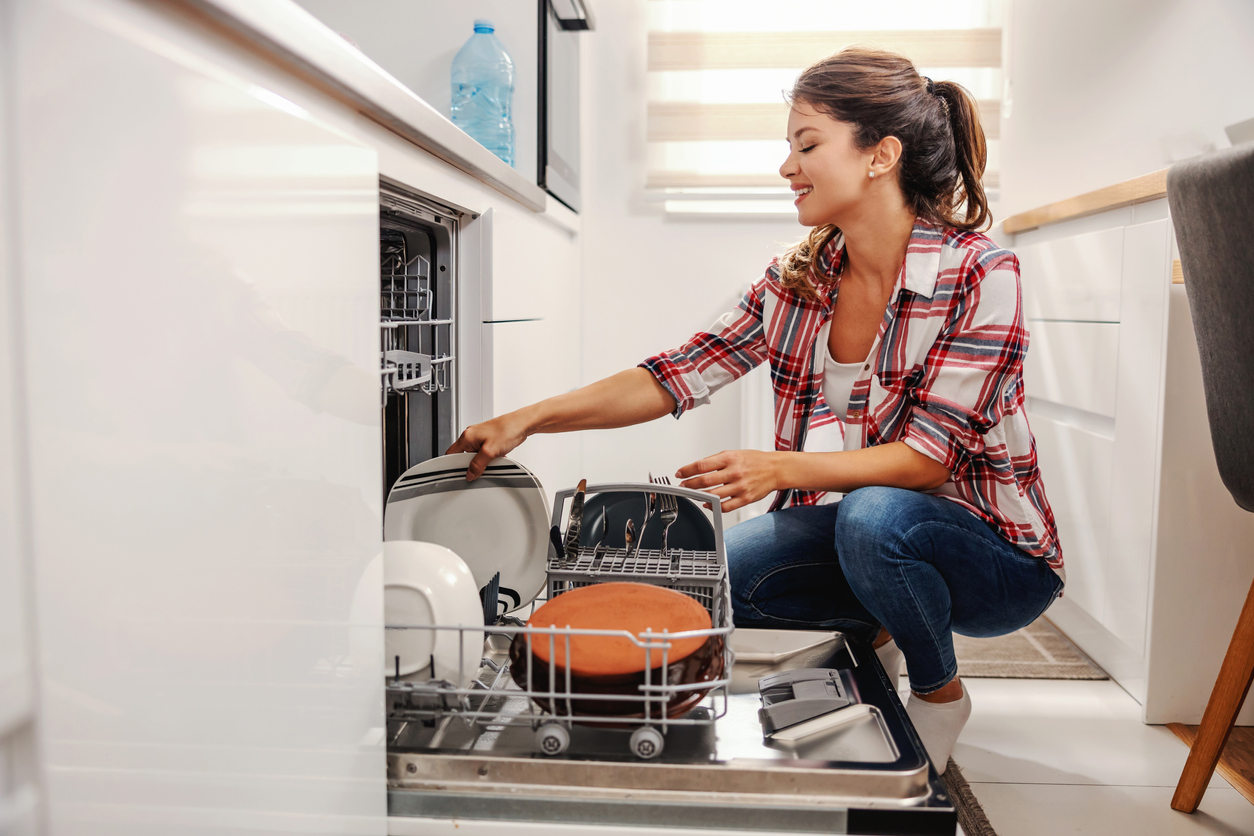
Unlike treating them, preventing hard water stains generally requires a one-time action. The prevention of hard water stains begins by eliminating the problem. Water softening systems can be installed to reduce the concentration of minerals in the water, eliminating white mineral stains.
Buy and Install a Water Softener
To install a water softener, you first need to select the right system for your household. There are several options in this space, differing in brand and capacity. Selecting the right size is important and depends on your water demand and, generally, your household size. A system that is not large enough to support your water demand can result in water delivery issues.
You may want to consider hiring a plumber to install your water softener properly, but you can also install a water softening system yourself.
Other Hard Water Stain Prevention Methods
While softening water is the best way to prevent hard water stains, other solutions exist. Adding a cup of white vinegar to the top rack of your dishwasher before running it will help minimize hard water stains. Vinegar is a mild acid that helps your dishwasher cut through hard water minerals. This solution is safe, as vinegar is nontoxic. It is also very cost-effective, as you can purchase large containers of vinegar inexpensively.
Our Top 3 Water Softener Picks
For a household water softener, we recommend an Envirotec model. Envirotec water softeners come in different sizes to satisfy different needs. Here are our top picks from our catalog:
- Largest Capacity: Envirotec Water Softener System ET64H
- Mid-Sized Capacity: Envirotec Water Softener System ET50HWS
- Smallest Capacity: Envirotec Water Softener System ET42H
1. Envirotec Water Softener System ET64H
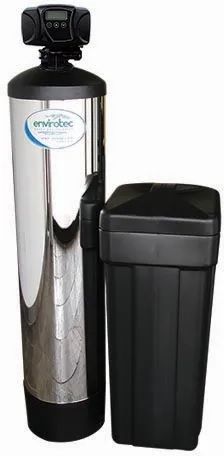
This Envirotec water softener system features a multiple-tank design, which allows for easier movement of the system for service work or relocation to a new home. It has a very large capacity of 64,000 grains. This size system regenerates the least, extending the system’s lifespan. The large capacity also eliminates hard water bleed-through, giving you a better result.
Capacity: 64,000 grains
Features:
- Highest Capacity
- Multiple Tank Design
- Regeneration Tank
- Maxflow™ Valve
- Enviroguard™
- Ultrastar™ Resin High-Temperature Resin
- Outstanding warranty
2. Envirotec Water Softener System ET50HWS
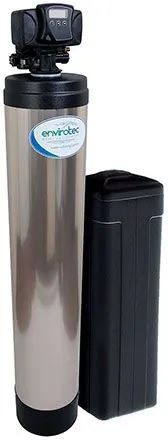
Featuring a cutting-edge efficiency booster, this Envirotec water softener precisely times regeneration, cutting water and salt consumption by as much as 75% over standard systems. Its valve ensures outstanding flow rates, improving your home's water pressure.
Capacity: 50,000 grains
Features:
- Digital Demand Monitoring
- Superior Capacity
- Multiple Tank Design
- Regeneration Tank
- Maxflow™ Valve
- Enviroguard™
- Ultrastar™ Resin High-Temperature Resin
- No warranty compares
3. Envirotec Water Softener System ET42H
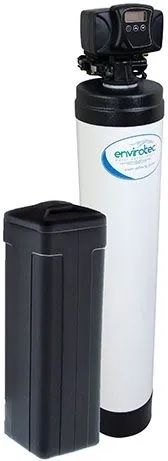
Shop Envirotec Water Softener System
This compact Envirotec water softener is the smallest in our selection but is specifically engineered to tackle the toughest water conditions. Equipped with MaxFlow technology, it effortlessly ensures a powerful flow rate to meet your household’s water demands.
Capacity: 42,000 grains
Features:
- Designed to handle harsh water conditions
- MaxFlow™ high flow metered demand valve
Best Practices for Maintaining a Spotless Dishwasher
Keep your dishwasher running efficiently and prevent hard water stains with these simple tips:
| Feature | Description |
|---|---|
| Regular Cleaning | Remove food debris and run an empty cycle with vinegar to break down grease and minerals. |
| Monthly Deep Clean | Sprinkle baking soda and run a hot water cycle to scrub away residue and odors. |
| Use Dishwasher Cleaner | Apply a store-bought cleaner monthly to remove limescale and buildup. |
| Clean the Spray Arms | Rinse the spray arms and use a toothpick to clear clogs for better water flow. |
| Prevent Hard Water Stains | Use a water softener or add vinegar during a cycle to reduce mineral deposits. |
| Inspect Door Seals | Regularly check seals for wear and replace them to prevent leaks. |
| Run Hot Water First | Run hot water in the sink before starting the dishwasher for better cleaning results. |
| Avoid Overloading | Ensure proper spacing in the dishwasher to avoid blocking the spray arms. |
By following these concise tips, you’ll maintain a spotless dishwasher and keep your dishes sparkling clean. Regular maintenance will help prevent hard water stains and extend your dishwasher’s lifespan.
FAQ
Here are some frequently asked questions about removing stains from glass:
Can I prevent hard water stains from forming on my dishes?
You can use a rinse aid in your dishwasher to prevent hard water stains, which helps water slide off dishes more easily. Additionally, wiping glassware dry immediately after washing can help prevent mineral deposits from forming.
What should I avoid when trying to remove hard water stains?
Avoid using abrasive sponges, steel wool, or harsh chemicals like bleach, as these can scratch glass and damage dishes. Stick to gentle cleaning agents and soft cloths or sponges.
Are there any long-term solutions to reduce hard water stains?
Installing a water softener in your home can help reduce the mineral content in your water, preventing hard water stains from forming on your dishes and glassware over time.
How do I remove hard water stains from dishes without vinegar or lemon juice?
You can use baking soda if you don't have vinegar or lemon juice. Apply a paste with baking soda and water to the stains, and scrub with a soft sponge. Rinse thoroughly and dry.
Why Trust Spencer’s TV & Appliance?
Since 1973, Spencer’s TV & Appliance has grown to 10 locations throughout the Phoenix Metropolitan Area. The secret to our longevity is simple: personal service. Customer satisfaction have always been the focus of our business, and throughout the years, we have been able to work hard with our suppliers to bring you the best prices. After all, getting customers the best price and personal attention is how we compete with big-box stores, day in and day out.
Not only do we offer top-rated appliances, name-brand electronics, and the best mattresses on the market but we also provide water treatment solutions and perform kitchen design services. Stop by your nearest Spencer’s and see what you’re missing!
Shop Water Softener Systems at Spencer’s
At Spencer’s TV & Appliance, we provide high-quality, name-brand products at great prices — check out our catalog to shop water filtration systems online today. Your friends in the business are always happy to help you find the best water softener for your home. Call us, or better yet, stop by at one of our locations in the Phoenix, Scottsdale, and Glendale regions. Visit us today!\
→ Learn More: 10 Signs Water Treatment is Needed in Your Home